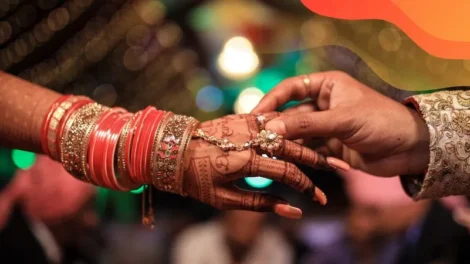Marriage duties have changed recently. In marriages, gender norms and expectations determine who does what. As society changes, so do couples’ expectations. Hence the question arises – why do responsibilities shift to men after marriage?

The shift of obligations to men after marriage is noteworthy. Women have traditionally done housework, childcare, and other chores. However, as more women work outside the home and strive for equality in all parts of life, marriages are becoming more equal.
This section will explain these trends and how social norms are being challenged. We will discuss gender roles in marriage, shifting expectations for men and women, and how these changes affect relationships.
Table of Contents
These subjects help us comprehend how modern marriages are redefining gender roles. This section highlights the changing dynamics of marriage obligations and the significance of open communication and mutual understanding as partners manage these changes.
Traditional Gender Roles Before Marriage
Men and women have different premarital roles. In many societies, men assume more home duties after marriage. Societal standards, cultural traditions, and historical viewpoints explain this transition.
Traditional gender standards may explain why men take on more after marriage. These standards require males to provide for their families and women to cook, clean, and raise children. These expectations sometimes arise from historical divisions of labor where men worked physically demanding jobs outside the home and women managed the household.
Cultural traditions influence gender roles before marriage. Some marriage ceremonies reinforce these customary notions. Dowry systems or bride price practises may emphasize men’s financial capacity as a marriage qualification.
Social norms might also affect a married couple’s responsibilities. Even if they disagree, family and friends may urge couples to follow gender norms.
These conventional gender roles differ by culture and area. As society becomes more aware of equality and relationship dynamics, gender roles change.
Finally, societal standards, cultural traditions, historical viewpoints, and external forces explain the shift in obligations to men following marriage. However, social assumptions affect these roles, which change throughout time.
Factors Influencing – Why Do Responsibilities Shift to Men After Marriage
Today’s marriages shift responsibilities due to many circumstances. Modernization, education, job aspirations, and personal tastes and relationships are among these variables.
Modernization and evolving societal norms
Traditional gender roles are changing. Marriage duties and obligations have become more equal in many societies. Changing social norms emphasize shared responsibility and reciprocal support in partnerships.
Impact of education and career aspirations
Education shapes marriage and gender roles. As more women pursue higher education and successful careers, their expectations about household chores may change. Men who prioritize education and employment may be more willing to share domestic duties with their partners.
Individual preferences and relationship dynamics
Every married couple divides responsibilities differently. Household task allocation is mostly determined by personal preferences. Personal interests, talents, availability, and cultural backgrounds might affect how couples share duties.
After marriage, men may take on extra responsibilities, but this is not true in all partnerships or cultures. Open communication, understanding each other’s needs, mutual agreement, and respect for individual decisions should guide marriage labour division.
These factors shape post-marriage duties. As society embraces variety in relationships, it’s important to create an environment where both couples may succeed individually and professionally while sharing domestic tasks.
Cultural Factors Influencing the Shift in Responsibilities to Men
Cultural variables shape social expectations and transfer male responsibilities. In patriarchal countries, cultural norms and beliefs perpetuate gender stereotypes and assign men specific obligations.
Men’s cultural expectations vary by culture and community. In certain cultures, men are the breadwinners and women are housewives. Power dynamics can reinforce gender inequity.
Gender stereotypes shift obligations to males. Men are expected to be powerful, assertive, and independent; thus, society may think they should lead or make crucial decisions.
However, cultural variables can change. As societies become more aware of gender stereotypes and patriarchal conventions, they are challenging them.
Gender equality is promoted globally through confronting damaging cultural conventions and ideas. Education efforts, legal reforms, and gender equality initiatives strive to break down obstacles and build a more inclusive society where gender doesn’t define duties.
In conclusion, patriarchal society, cultural norms and beliefs, gender stereotypes, and societal expectations of males all influence men’s obligations. To achieve gender equality, society must confront these norms.
Economic Factors and Changing Gender Roles in Modern Marriages
Economics and gender roles shape modern marriages. Due to dual-income homes, gender roles are changing.
Female financial independence is crucial. More women are working and supporting themselves financially. Economic empowerment has changed marriage and gender roles.
Work dynamics and duties also affect modern marriages. Men traditionally worked and women took care of domestic tasks and children, but this is changing. Based on their strengths and interests, couples negotiate and share duties.
Changes have brought benefits and drawbacks. Dual-income households offer financial stability and the possibility of attaining common goals. However, it can create stress as couples balance work and home.
Economic circumstances and gender roles have revolutionized modern marriages by fostering equality in decision-making and allowing spouses to adapt to shifting societal expectations.
The Role of Parenting and Family Expectations in Assigning Responsibilities to Men
After marriage and childbirth, many societies expect men to take on responsibilities. This is due to generations of social standards and gender roles.
Fatherly expectations have changed. Fathers are now considered as child-rearing partners rather than just providers and breadwinners. This transition is motivated by an increasing awareness of the benefits of shared parenting for child well-being and development.
Today, many couples want to share household and parenting duties. This lets women work and strengthens father-child bonds.
These modifications may not occur automatically or globally. Cultural norms and family dynamics determine family duties. True shared parenting requires open communication, understanding, and a willingness to question gender stereotypes.
Negotiating an Equal Partnership: Communication and Mutual Agreement Between Spouses
In traditional relationships, men take on additional obligations. Open communication between spouses is essential for a healthy, equal partnership.
Couples can modify gender roles in their marriage by discussing expectations, aspirations, and concerns. This means questioning gender-based prejudices and norms.
Both couples must actively participate in decision-making and household activities to establish an equal division of responsibilities. Cooperation and compromise can accomplish this.
Couples can achieve harmony and respect by creating an equal partnership based on shared values and goals. True marriage equality requires good communication and a willingness to confront norms.
The Impact on Men’s Mental Health and Well-Being from Increased Responsibilities
After marriage, couples’ obligations usually grow. Husbands and fathers traditionally have more obligations. It can affect their mental health and well-being.
After marriage, cultural expectations and gender roles transfer obligations to men. Being the primary breadwinner, managing finances, and supporting the family may be expected. Men are still expected to play these roles, even though they are becoming more flexible.
As husbands and fathers, men find work-life balance harder to achieve. Balancing work and family can raise stress, time pressure, and overwhelm. Unmanaged, this juggling act might harm mental health.
Due to stigmas around vulnerability and seeking treatment, males may have distinct mental health issues after marriage. Men are typically pressured to be tough and independent, making it hard for them to communicate their emotions or ask for help.
Recognising how greater duties affect men’s mental health is vital. Individuals, couples, employers, and society should encourage open dialogue about men’s multitasking issues. Counseling and support groups for married men can improve mental health.
Conclusion: Striving for Balanced Partnerships in Marriage for Happier Relationships
In traditional relationships, men take on additional obligations. Social conventions, gender roles, and cultural expectations caused this change.
Traditional gender roles may transfer responsibilities to men after marriage. Many cultures require men to provide for their families. This expectation often results in men handling finances and women handling household duties.
“Provider mentality”—the idea that men must provide for their families to be good husbands and fathers—also contributes to this shift. To satisfy expectations, they may work more hours and take on more tasks.
Social expectations also shape these processes. Society values male attributes like ambition, competitiveness, and financial achievement. In order to match cultural expectations, males may prioritize their employment and take on greater duties.
Couples should realize that balanced partnerships can make them happier. Couples can establish respect and support by sharing financial and domestic duties equally.
In conclusion, while there may be many reasons why responsibilities shift to men after marriage, couples must challenge gender conventions and seek balance. By doing so, they can build happier relationships based on understanding and accountability.



Add Comment